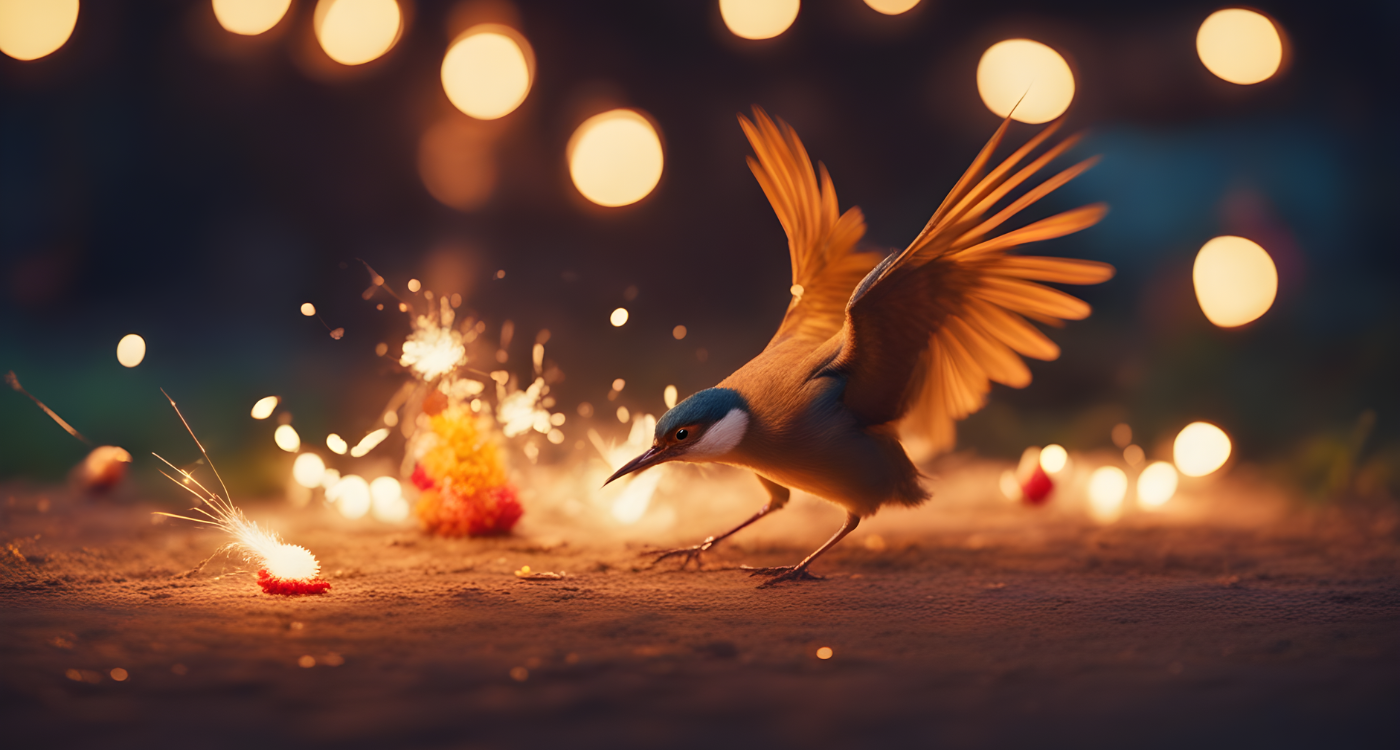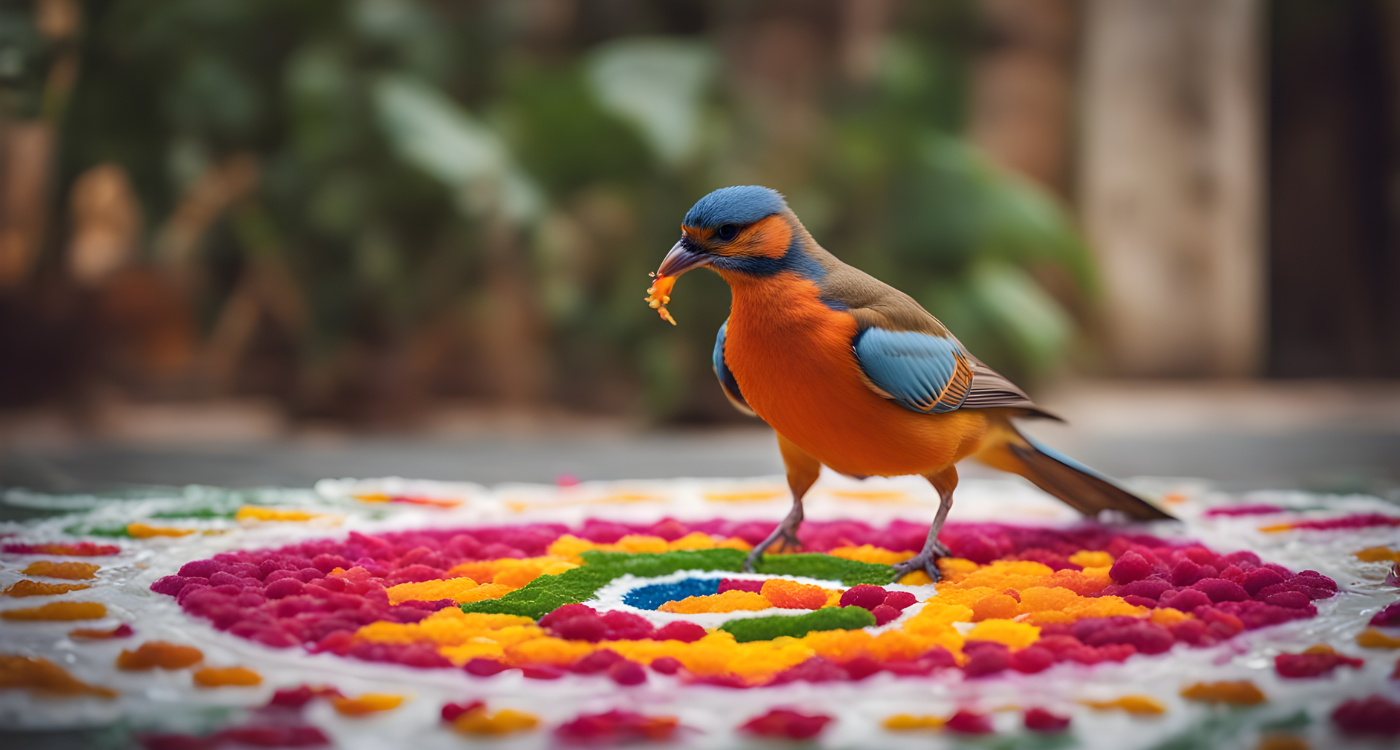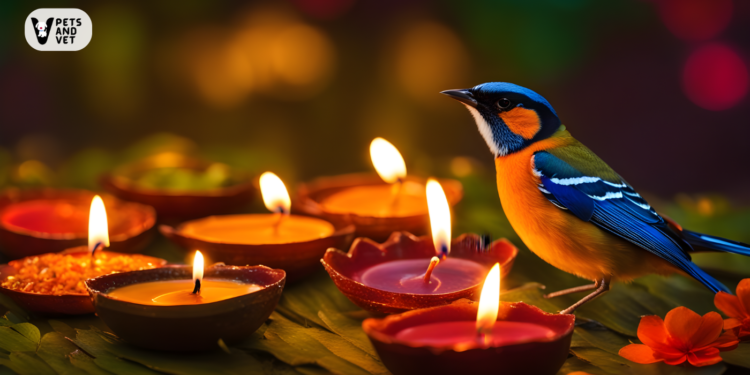In a world that constantly searches for balance with nature, celebrating a Bird-Friendly Diwali appears as a beacon of hope for bird wildlife. Diwali, the festival of lights, is a time of joy, togetherness, and tradition, but it has also become synonymous with noise, pollution, and distress for our feathered friends. As we try to find a delicate balance between our customs and the environment, this article explores the beautiful journey towards a more compassionate celebration a Bird-Friendly Diwali.
It’s a celebration that conveys not just light, but also a profound understanding of the need to protect our bird co-inhabitants, and in doing so, sets a beautiful example of how traditions can evolve with kindness. Join us on this informative path to discover alternative ways to celebrate a Diwali that’s not only bird-friendly but also deeply beneficial for all who participate in its adventure.
The Impact of Crackers on Birds

Diwali, the festival of lights, is a joyous occasion celebrated with great excitement across India. While the festivities bring delight to many, they can also cause distress to birds. The loud noise and bright flashes of firecrackers can be overwhelming and harmful to birds, causing them to panic, injure themselves, or even die.
Are crackers OK for Birds?
Crackers are not okay for birds. In fact, traditional crackers used during Diwali celebrations can be extremely harmful to birds. The loud noises and bright flashes of fireworks cause severe stress and anxiety to avian species. Birds have highly sensitive hearing, and the sudden, deafening explosions can disorient them, disrupt their sleep patterns, and even lead to physical injury.
Are Birds Afraid of Crackers?
Birds are indeed afraid of crackers. The loud, startling sounds of fireworks frighten them and can send them into a state of panic. Birds may fly erratically or collide with objects, resulting in injuries or fatalities. Additionally, the smoke and chemical residue from firecrackers can pollute the air and water, posing further risks to avian life.
To ensure a Bird-Friendly Diwali, it is essential to avoid using traditional crackers and consider alternative, noiseless celebrations and decorations that minimize harm to birds, allowing them to enjoy a safe and peaceful environment during the festive season.
Issues with birds during Diwali?
Diwali, the festival of lights, is a time of great celebration and joy for many people in India. However, the loud noises and bright flashes of firecrackers that are often used during Diwali can be very harmful to birds.
-
Hearing Damage: The sudden explosions of firecrackers can cause temporary or permanent hearing damage in birds. Their sensitive ears are not equipped to handle such loud noises.
-
Disorientation and Panic: The loud and unexpected noises can cause birds to become disoriented and panic. This can lead them to fly erratically and collide with objects, causing injuries or even death.
-
Desertion of Nests: The sudden commotion can cause mother birds to abandon their nests, leaving their eggs and hatchlings vulnerable to predators or exposure.
-
Respiratory Problems: The smoke and fumes released from firecrackers can irritate birds’ respiratory systems, causing breathing difficulties and even lung damage.
Bird-Friendly Diwali celebrations can have negative impacts on birds, animals, and the environment. Birds may become terrified by the loud noises of firecrackers, leading to panic and stress. This can cause birds to collide with buildings, trees, or other objects, resulting in injuries or fatalities.
Birds with young chicks may also lose their nests. Animals, such as dogs and cats, may become anxious and scared, leading to behavioral and health issues. Wild animals may be dislodged from their habitats or experience severe stress. Livestock animals may be agitated and distressed, impacting their well-being and productivity.
The chemicals and compounds used in firecrackers release pollutants into the atmosphere, contributing to air pollution. Residues from firecrackers can seep into soil and water, affecting ecosystems and aquatic life.
Light pollution can disrupt nocturnal animals, and the remains of burnt firecrackers contribute to non-biodegradable waste. Promoting Bird-Friendly Diwali and animal-friendly celebrations involves adopting alternative, eco-conscious ways to celebrate, such as using silent or low-decibel firecrackers, limiting their use, and choosing safe decorations and lighting.
Alternative Ways to Illuminate the Night

The flickering flames of diyas (earthen lamps) and candles are an integral part of Diwali celebrations or Animal-friendly celebrations. They symbolize the triumph of light over darkness, bringing warmth and illumination to homes and neighborhoods. However, traditional firecrackers, with their loud explosions and smoke, can cause significant distress and harm to birds. Fortunately, there are many bird-friendly alternatives that allow us to enjoy the festive glow without compromising the well-being of our avian neighbors.
Diyas and Candles: Embracing Tradition Sustainably
Diyas and candles, with their soft glow and gentle flicker, are the epitome of traditional Diwali lighting. Opt for natural and eco-friendly alternatives like beeswax candles or soy candles, which not only burn cleaner but also support sustainable practices. Place diyas and candles in designated areas, away from flammable materials and potential fire hazards, to prevent accidents.
Lanterns and String Lights: Painting the Night with Color
Colorful lanterns and string lights add a touch of vibrancy and festivity to Diwali decorations. Choose energy-efficient LED lanterns that consume less power and reduce environmental impact, illuminating homes and outdoor spaces with a warm, inviting glow. Hang lanterns strategically to enhance the decorations and brighten the night sky, creating a captivating spectacle without the harmful effects of firecrackers.
Sparkling Decorations: Embracing Creativity with Eco-consciousness
Diwali is not just about lights; it’s also about adorning homes and spaces with vibrant decorations. Instead of using disposable decorations that often end up in landfills, embrace creativity and eco-consciousness by crafting decorations from recycled materials. Paper mache and origami offer endless possibilities for creating unique and eye-catching decorations, while natural elements like leaves, flowers, and twigs add a touch of elegance and eco-friendliness.
Biodegradable Rangoli: Celebrating Diwali with Vibrant Natural Colors
Using natural and biodegradable materials for rangoli is a sustainable way to celebrate Diwali. Rice flour, colored chalk, and flowers are eco-friendly and bird-friendly options for creating vibrant designs. Rice flour is a non-toxic and biodegradable material that can be mixed with water to form a thick paste, and food coloring can be added for intricate designs. Colored chalk is another eco-friendly option, made from natural, non-toxic chalk. Flowers can be used to add color and fragrance to rangoli designs, adding a touch of nature to Diwali celebrations and Animal-friendly celebrations.
Biodegradable rangoli offers several benefits, including being eco-friendly, bird-friendly, and easy to clean. They decompose naturally, reducing environmental impact, and are easy to clean up by sweeping away the materials. To create a bird-friendly Diwali, avoid loud firecrackers and fireworks, opt for noise-free alternatives like flower pots and sparklers, create a bird-friendly environment by providing food and water sources, and plant trees and shrubs for shelter and nesting grounds. By incorporating these bird-friendly practices, we can celebrate Diwali in a way that respects and protects our feathered friends, ensuring that the Festival of Lights brings joy and harmony to all living creatures.
Bird-Friendly Sweets and Treats: Indulging without Compromise
Prepare and distribute animal-friendly sweets and treats that do not contain harmful ingredients for birds. Consider using natural sweeteners like honey or maple syrup instead of refined sugar, which can be toxic to birds. Offer a variety of bird-friendly snacks, such as seeds, fruits, and nuts, to attract feathered visitors and spread the joy of Diwali to our avian companions.
Conclusion
Diwali is a celebration of light, joy, and togetherness. Let us extend this spirit of harmony and compassion to our feathered friends by embracing bird-friendly practices during Diwali celebrations for birds and Animal-friendly celebrations. By opting for noise-free alternatives, using eco-friendly decorations, and preparing animal-friendly treats, we can create a Diwali that celebrates the beauty of life in all its forms, fostering a harmonious coexistence between humans and nature.
We’d love to hear your thoughts or stories in the comments. For more insights, visit PetsandVets.






